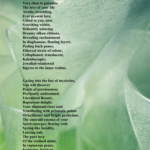Work as Play – The Heart and Spirit of Business
 It seems that increasing numbers of us are looking for different ways to live in a more balanced and fulfilling way, so that we feel connected with our work.
It seems that increasing numbers of us are looking for different ways to live in a more balanced and fulfilling way, so that we feel connected with our work.
At the heart of this is the growing desire to have a sense of purpose and a yearning for meaning in how we spend our time and make our living. We want to feel the spirit of what we do – to be inspired.
People who have been working in organisations for many years are now being asked to re-apply for their jobs, unable to take them for granted any more and having to market themselves as the best candidates. This means they are in effect becoming more entrepreneurial in their approach to their positions. And those entering or rejoining the job market need to be very clear and precise about what they offer and how they fit with prospective employers, both for their own sake in finding satisfying work, and in order to attract a suitable opportunity. (See: The ReSourceful Candidate)








